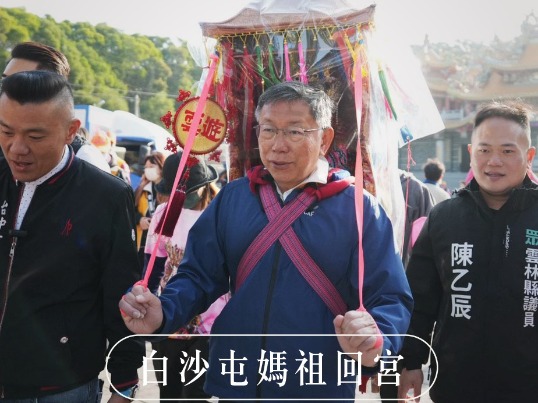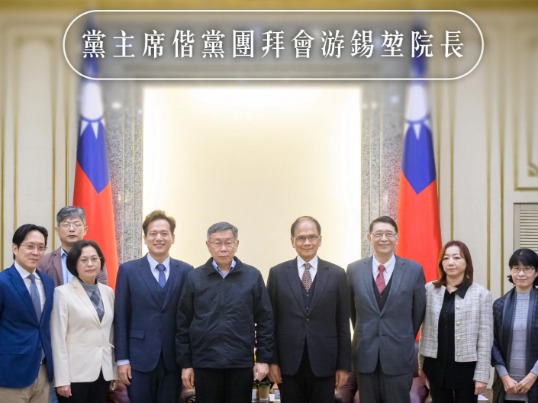Feb

One-Day, Two Lighthouses. One-Day Bike Ride from the North to South
In January 2016, Taipei Mayor Ko Wen-je challenged himself to complete the 367.6-kilometer "One-day bike ride from the North to the South." He successfully finished the bike ride in 19 hours and 28 minutes. The following month, in February 2016, he completed the 520-kilometer "One-day, Two Lighthouses" bike ride in 28.5 hours and delivered a speech at the finish line to promote an alternative way to commemorate the 228 anniversary. Mayor Ko suggested that we "replace tears with sweat". Since then, a meaningful and challenging bike ride has become Ko's way of commemorating the event. In 2022 and 2023, Mayor Ko completed the "One-day from the North to the South" bike ride multiple times, hoping to establish it as a tradition.
2023.02.25

Traditional religious procession of the goddess Mazu
Ko Wen-je has participated in the traditional religious procession of the goddess Mazu twice, adhering to the principles of "not carrying a sedan chair or paying courtesy visits to local officials". In 2023, he participated in the procession of the goddess Mazu in Baisha Township for the first time and walked 400 kilometers on foot for 9 days, forming amicable friendships along the way.
2023.02.11

The Strongest Opposition in the Legislative Yuan
The Taiwan People's Party Opposition Caucus has been overseeing the government since its establishment in 2020. Despite only having five members, including Chiu Chen-yuan, Lai Hsiang-lin, Jang Chyi-lu, Wu Hsin-ying, and Chen Wan Hui, they have been diligently handling complex bills across the eight committees in the Legislative Yuan. They have been closely monitoring issues related to industrial transformation, digital development, household electricity usage, housing justice, and pandemic policies. They have been awarded "Outstanding Legislators" multiple times, having proposed over 497 bills, with 126 of them passing the third reading.
They have also organized public hearings and forums, serving as a bridge of communication between the government and the people. They are undoubtedly the "strongest opposition." in the Legislative Yuan.
Strengthening National Defense
From the lessons of the Russia-Ukraine conflict, the TPP caucus is demanding that the Ministry of National Defense improve Taiwan's national defense strategy immediately. This includes incorporating artificial intelligence to establish a comprehensive view, training and operation for unmanned drones, addressing the shortage of ammunition in Taiwan and the difficulties of obtaining foreign aid, and adjusting the organization and structure that was previously focused on land-based powers. They also aim to find ways to restore communication between both sides of the Taiwan Strait to avoid misjudgments caused by information asymmetry. Only by doing so can Taiwan quickly respond to future changes.
Housing Justice
In pursuit of housing justice, the TPP is serious about addressing the issue of skyrocketing housing prices that have increased by 25% throughout President Tsai Ing-wen's tenure. The high cost of living and low wages have made life unbearable for many citizens, yet there are not enough social housing units available and purchasing a house has become unaffordable. This has created a nightmare for the younger generation
who cannot envision a good quality of life or future planning. The TPP caucus calls on the government to implement measures such as imposing tax on speculative housing transactions and increasing social housing options, as well as promoting transparency in the rental market to make housing affordable and safe. These efforts align with our goal of achieving housing justice where people can live with dignity and security.
Reforming Labor Insurance System
The reform of the labor insurance system is urgent. The TPP's caucus urges the Bureau of Pension Funds to carefully evaluate the risks of its investments and reduce the impact of market volatility on fund returns. The government should set up a pension working group that includes representatives from both the ruling and the opposition party, following the spirit of consensus-building seen in Sweden. This will help to establish a basic agreement so that a specific plan can be smoothly presented after the new government takes office in 2024
The TPP caucus refers to the experiences of South Korea and Singapore to incorporate penalties into the Personal Data Protection Act, and has proposed a draft for Personal Data Protection Commission Organization Act to establish an independent regulatory body. This regulatory body will proactively
investigate major personal data breach and impose penalties in accordance with the law. In the future, the TPP caucus will also promote the amendment of the Personal Data Protection Act, with the goal of implementing both preventative measures and legal deterrence to prevent data breach.
Transformation of the Egg Chicken Industry
The price of eggs has increased by NT$2 per catty, with the wholesale price reaching NT $52 per catty, reaching a historical high. Over the past 7 years, egg prices have risen by 38.5%, causing great distress to the public and street vendors. However, the Council of Agriculture has not yet devised a plan
to guide the transformation of chicken coops. Without effective measures, the impact of avian influenza and unstable temperature fluctuation will adversely impact the egg production rates. In addition, the destabilization of corn feed price will lead to an accelerated imbalance between egg production and
sales. The TPP calls on the new cabinet to change the arrogant attitude of ignoring public grievances and address the egg shortage crisis immediately. To start, they should begin with proposing reform measures to solve the root cause of the problem, promoting the transformation of traditional chicken coops, taking firm actions on price gouging behavior, optimizing the egg production and sales mechanism.
Water Shortage
Under the rule of the Democratic Progressive Party, water shortage has become inevitable despite spending NT$135.7 billion in Forward-Looking Infrastructure Development Program for water. The TPP believes that the problems lie in the proper distribution of water. We urge the government to fairly allocate water resources, accelerate the replacement of old water pipes, increase mid-stream water storage facilities, actively develop recycled water, groundwater and desalination technologies, establish a flexible regional water distribution mechanism, improve water usage culture through education, and effectively reduce water waste.
2023.02.07



